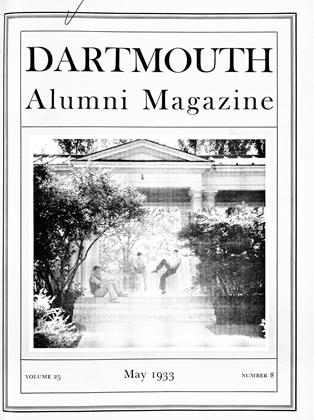By Roy F. Bergengren '03, Boston, Mass., The Stratford Cos., 1932.
"We the People" is an expression of one man's confidence in the democratic ideal of government and a study of America's failings in approximating that ideal. It is Mr. Bergengren's testament of personal idealism,—a testament marked by deep earnestness of conviction, by no little mellow charm of statement, and by comprehensiveness of survey.
The element of unity in this structure of criticism is an inquiry into the fundamental purposes of the United States and into the measure in which those purposes have been fulfilled in contemporary American life. "The primary purpose of America," Mr. Bergengren concludes from a study of early American documents,— the Declaration of Independence, the Constitution, the writings and addresses of Franklin, Washington, Lincoln, and others, "is to establish the practicality of the principle of equality, enunciated in the Declaration of Independence." All that is needed today is rigorous adherence to the principles of human association there defined. We have come to our present impasse because we have forgotten those principles and have failed to incorporate them into our institutional life.
The ensuing survey of contemporary American life touches upon the problems of distribution of wealth, of machine-ridden civilization, of instalment buying, of stock gambling, of usury, of banking, of government, and finally of international relations, and announces in each connection a simple principle of settlement which is in accord with the "purposes" of the nation and to which the author is convinced we may look for resolution of our difficulties. Thus he advocates a law preventing the transfer, direct or indirect, by gift or will, by one individual to another of an accumulation of wealth more than is adequate to reasonable protection. In general individuals should be protected in what they earn, not in what they accumulate. The working day should be reduced to six hours and the working week to five days. Usury and high-rate money lending should be eliminated by the establishment and operation by the United States of smallloan banks. The banking structure, the stock market, the motion picture industry should be made special objects of study by impartial agencies having in mind the purposes to which America is committed. People should be educated to a sense of responsibility for the failings of the governments, city, state and federal, which they elect. Turning to international problems, Mr. Bergengren advocates the linking of the problems of war-debts and of disarmament. Debts should not be cancelled but should be used as a means of negotiating world peace: a 50-year moratorium on debt payments should be made conditional upon a 50-year moratorium on preparations for war by the nations concerned. It is a program of recommendations which commends itself for its straightforwardness and evident thoughtfulness.
If Mr. Bergengren's book is not studiously profound in its attack on any single problem, if it is diffuse and general in its recommendations, if it is casual and Tory and conversational rather than studied and concentrated in formulation, it is because such was the intent of the author. Seeing a number of things that needed very much to be said and despairing of another's saying them, he accepted the responsibility himself and gave us "We the People." —MORRIS B. STORER.
 View Full Issue
View Full Issue
More From This Issue
-
 Article
ArticleHANOVER BROWSING
May 1933 By Rees Higgs Bowen -
 Class Notes
Class NotesClass of 1910
May 1933 By Harold P. Hinman -
 Class Notes
Class NotesClass of 1929
May 1933 By Frederick William Andres -
 Class Notes
Class NotesClass of 1902
May 1933 By Hermon W. Farwell -
 Article
ArticleDARTMOUTH'S WATCH ON THE RHINE
May 1933 By Gail M. Raphael '34 -
 Class Notes
Class NotesClass of 1932
May 1933 By Charles H. Owsley








